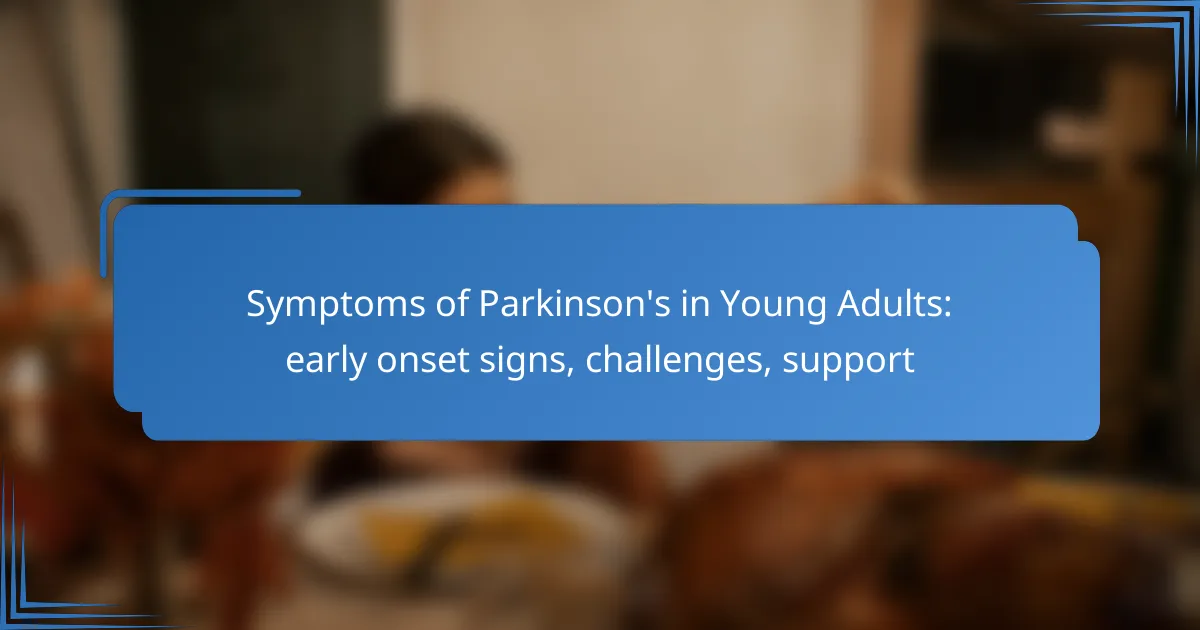Parkinson’s disease can affect young adults differently than older individuals, presenting early onset symptoms such as tremors, bradykinesia, and muscle stiffness. These symptoms can lead to significant challenges in daily life, including social stigma and employment difficulties. However, with appropriate management strategies like physical therapy, medication, and support groups, young adults can improve their quality of life and navigate the complexities of living with Parkinson’s.
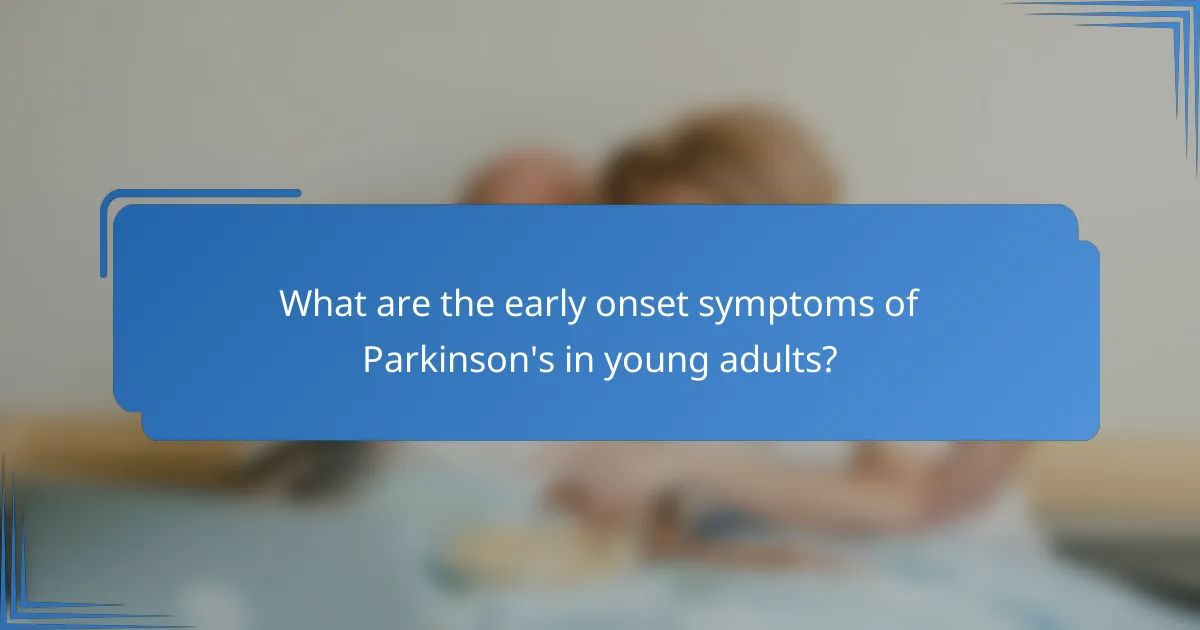
What are the early onset symptoms of Parkinson’s in young adults?
Early onset symptoms of Parkinson’s in young adults can manifest differently than in older individuals, often presenting unique challenges. Key symptoms include tremors, bradykinesia, muscle stiffness, postural instability, and changes in handwriting, which can significantly impact daily life.
Tremors and shaking
Tremors are one of the most recognizable symptoms of Parkinson’s disease, often starting in the hands or fingers. In young adults, these tremors may be mild and can occur at rest or during movement, making them less noticeable initially.
These involuntary movements can also affect the legs, jaw, or even the head. Young adults experiencing tremors should consult a healthcare provider for assessment and potential management strategies.
Bradykinesia
Bradykinesia refers to the slowness of movement, which can significantly affect daily activities. Young adults may notice a gradual reduction in their ability to initiate or complete movements, leading to difficulties with tasks like buttoning a shirt or walking.
This symptom can also contribute to a general sense of fatigue and decreased motivation, as simple actions require more effort. Recognizing bradykinesia early can help in seeking appropriate therapies to manage its impact.
Muscle stiffness
Muscle stiffness, or rigidity, is another common symptom that can develop in young adults with Parkinson’s. This stiffness can lead to discomfort and reduced flexibility, making it challenging to perform everyday movements.
Young adults may experience stiffness in specific muscle groups, which can cause pain and limit mobility. Engaging in regular physical activity and stretching can help alleviate some of these symptoms.
Postural instability
Postural instability involves difficulties with balance and coordination, which can increase the risk of falls. Young adults may find themselves swaying or feeling unsteady while standing or walking.
To manage this symptom, incorporating balance exercises and physical therapy can be beneficial. Awareness of surroundings and using supportive devices when necessary can also help prevent accidents.
Changes in handwriting
Changes in handwriting, known as micrographia, can occur in young adults with Parkinson’s. This symptom often manifests as smaller, more cramped writing, making it difficult to read.
Individuals may notice a decline in their ability to write clearly or maintain consistent letter sizes. Using larger writing tools or practicing writing techniques can assist in managing this change.
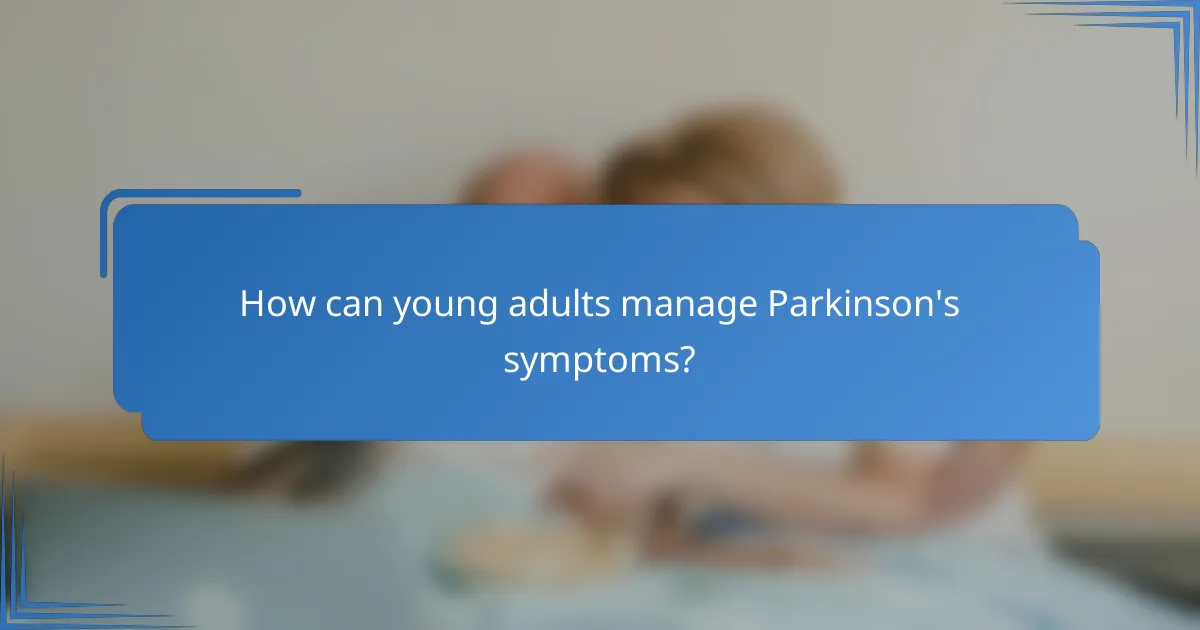
How can young adults manage Parkinson’s symptoms?
Young adults can manage Parkinson’s symptoms through a combination of physical therapy, medication, support groups, and healthy lifestyle choices. These strategies can help improve mobility, reduce discomfort, and enhance overall well-being.
Physical therapy
Physical therapy is crucial for young adults with Parkinson’s as it focuses on improving movement and coordination. A tailored program can include exercises that enhance strength, balance, and flexibility, which are often affected by the disease.
Regular sessions with a licensed physical therapist can help track progress and adjust exercises as needed. Incorporating activities like walking, swimming, or cycling can also be beneficial for maintaining mobility.
Medication options
Medications for managing Parkinson’s symptoms typically include dopaminergic drugs, which help replenish dopamine levels in the brain. Common options include levodopa and dopamine agonists, which can alleviate motor symptoms.
It’s essential for young adults to work closely with their healthcare provider to find the right medication and dosage, as individual responses can vary. Regular follow-ups can help manage side effects and adjust treatment plans effectively.
Support groups
Support groups provide a vital resource for young adults coping with Parkinson’s. These groups offer a space to share experiences, challenges, and coping strategies, fostering a sense of community and understanding.
Joining local or online support groups can connect individuals with others facing similar challenges, reducing feelings of isolation. Many organizations also provide resources and information about living with Parkinson’s.
Healthy lifestyle choices
Adopting healthy lifestyle choices can significantly impact the management of Parkinson’s symptoms. Regular exercise, a balanced diet rich in fruits, vegetables, and whole grains, and sufficient hydration are key components.
Avoiding excessive alcohol and tobacco use can also improve overall health. Additionally, prioritizing sleep and stress management techniques, such as mindfulness or yoga, can contribute to better symptom control and quality of life.
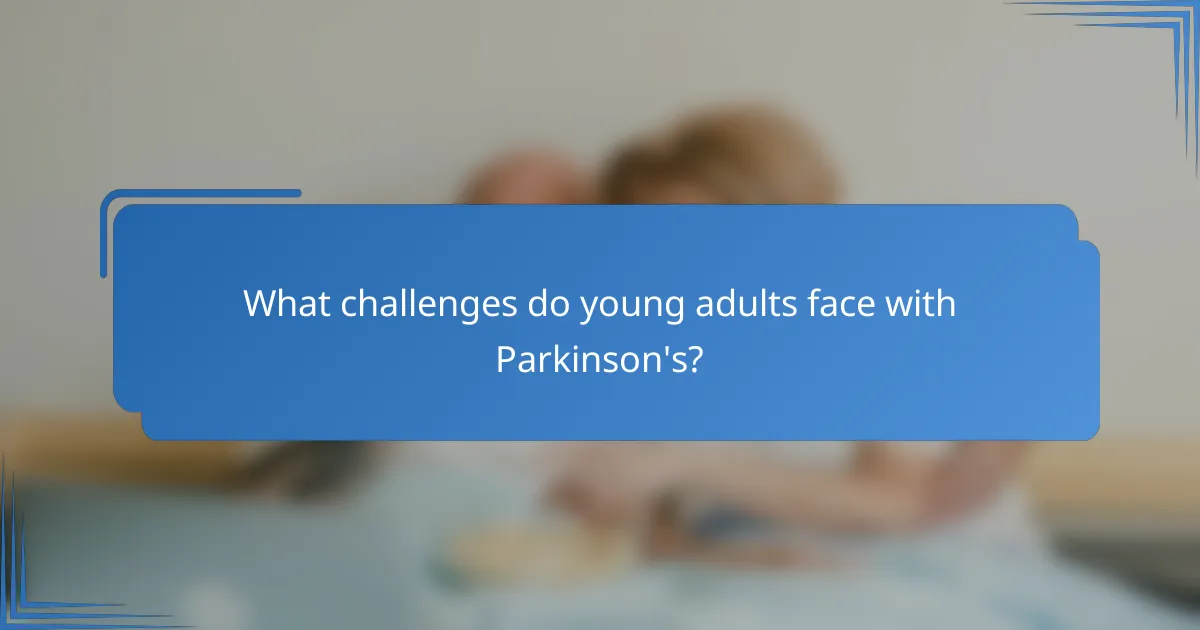
What challenges do young adults face with Parkinson’s?
Young adults with Parkinson’s disease encounter unique challenges that can significantly impact their daily lives. These challenges include social stigma, employment difficulties, and emotional health issues, all of which can complicate their experience with the disease.
Social stigma
Social stigma surrounding Parkinson’s can lead to misunderstandings and isolation for young adults. Many people associate the disease with older individuals, which can result in a lack of awareness and empathy from peers. This stigma may discourage young adults from discussing their condition openly, further exacerbating feelings of loneliness.
To combat social stigma, education and awareness campaigns can be beneficial. Encouraging open conversations about Parkinson’s can help demystify the disease and foster a more supportive environment.
Employment difficulties
Young adults with Parkinson’s often face employment challenges, including discrimination and difficulties in maintaining job performance. Symptoms such as tremors, fatigue, and cognitive changes can hinder their ability to work effectively, leading to concerns about job security.
Employers are required to provide reasonable accommodations under the Americans with Disabilities Act (ADA) in the U.S. This may include flexible hours or modified duties. Young adults should advocate for their needs and seek support from organizations that specialize in workplace rights.
Emotional health issues
The emotional health of young adults with Parkinson’s can be significantly affected by the diagnosis and its implications. Anxiety and depression are common, stemming from the challenges of living with a chronic illness at a young age. These emotional struggles can impact relationships and overall quality of life.
Seeking professional help, such as therapy or support groups, can provide valuable coping strategies. Engaging with others who understand the experience can help alleviate feelings of isolation and promote emotional well-being.

What support resources are available in New Zealand?
In New Zealand, various support resources are available for individuals with Parkinson’s disease, especially for young adults experiencing early onset symptoms. These resources include national organizations, online platforms, and local support groups that provide information, community, and assistance.
Parkinson’s New Zealand
Parkinson’s New Zealand is the primary national organization dedicated to supporting individuals affected by Parkinson’s disease. They offer a range of services, including educational resources, advocacy, and information on managing symptoms. Their website provides access to a wealth of information tailored to the needs of young adults facing early onset Parkinson’s.
Additionally, Parkinson’s New Zealand organizes events and workshops that foster community engagement and provide practical strategies for living with the condition. They also have trained staff who can offer personalized support and guidance.
Online communities
Online communities provide a vital support network for young adults with Parkinson’s. These platforms allow individuals to connect with others who share similar experiences, offering a space for sharing advice, coping strategies, and emotional support. Popular forums and social media groups can be found on platforms like Facebook and Reddit.
Engaging in these online communities can help reduce feelings of isolation and provide a sense of belonging. Participants often share valuable resources, including articles, videos, and personal stories that can be beneficial for managing the challenges of early onset Parkinson’s.
Local support groups
Local support groups are essential for fostering in-person connections among individuals with Parkinson’s disease. These groups often meet regularly, providing a safe environment for sharing experiences and discussing coping mechanisms. Many cities in New Zealand have established support groups specifically for young adults.
Joining a local support group can enhance emotional well-being and provide practical advice tailored to the unique challenges faced by younger individuals. To find a group, individuals can contact Parkinson’s New Zealand or search community boards for listings of local meetings and events.
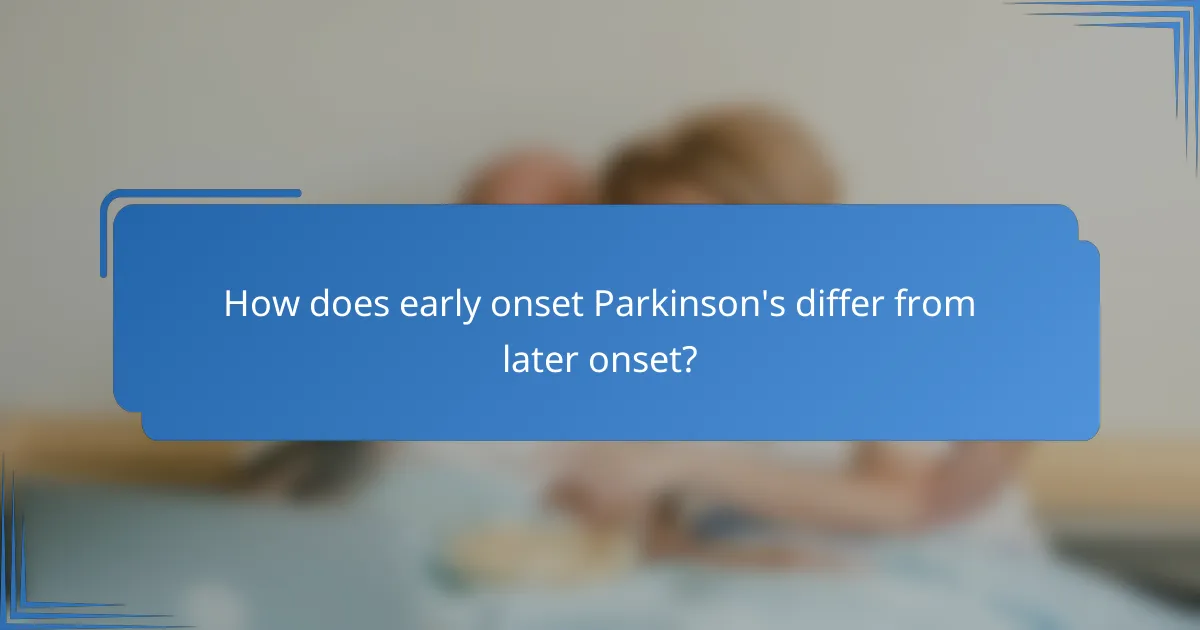
How does early onset Parkinson’s differ from later onset?
Early onset Parkinson’s disease, diagnosed before the age of 50, often presents differently than later onset cases. Symptoms may appear more gradually and can include a wider variety of non-motor symptoms, which can complicate diagnosis and treatment.
Early onset symptoms
In young adults, early onset Parkinson’s may manifest through tremors, rigidity, and bradykinesia, but non-motor symptoms like depression, anxiety, and sleep disturbances are also common. These additional symptoms can significantly impact daily life and may be overlooked during initial evaluations.
Young adults might experience a different progression of motor symptoms compared to older individuals. For instance, they may have a slower decline in mobility but face greater challenges in managing work and social responsibilities due to the non-motor aspects of the disease.
Challenges faced by young adults
Young adults with early onset Parkinson’s often encounter unique challenges, including social stigma and the impact on career development. They may struggle to find appropriate support networks, as many resources are geared towards older patients.
Financial concerns can also be significant, as young adults may not yet have established careers or savings. The cost of treatment and potential loss of income can create additional stress, making it crucial to explore available resources and support systems.
Support and resources
Support for young adults with early onset Parkinson’s can come from various sources, including specialized support groups and online communities. Connecting with others who share similar experiences can provide emotional support and practical advice.
It is essential to seek medical professionals who understand the unique aspects of early onset Parkinson’s. Engaging with neurologists who specialize in movement disorders can help ensure tailored treatment plans that address both motor and non-motor symptoms effectively.
